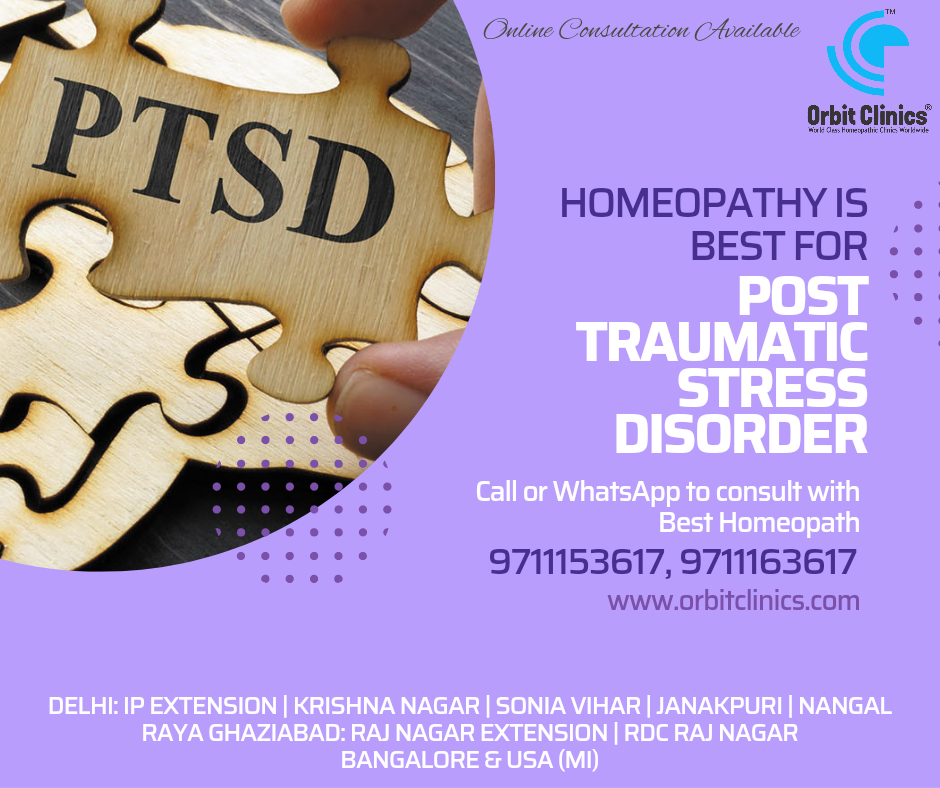
Written by
Dr. Deepak Sharma
BHMS, MD, Ph.D. (Scholar)
Homeopathic Physician and Educator, Founder – Orbit Clinics
PTSD, or Post-Traumatic Stress Disorder, is a mental health condition that can develop in people who have experienced or witnessed a traumatic event. The symptoms of PTSD can be severe and long-lasting, and can interfere with a person’s ability to function in daily life.
Causes:
The exact cause of PTSD is not fully understood, but it is believed to be a combination of genetic, environmental, and psychological factors. Traumatic events that can lead to PTSD include physical or sexual assault, natural disasters, combat exposure, serious accidents, and the sudden death of a loved one.
Risk factors:
Some factors that may increase a person’s risk of developing PTSD include:
- Exposure to a traumatic event
- A history of mental illness
- A history of trauma or abuse
- A lack of social support
- Having a job that involves exposure to trauma, such as military personnel, first responders, or healthcare workers.
Pathology:
PTSD is a disorder that affects the brain’s ability to process and cope with traumatic experiences. When a person experiences trauma, their brain goes into a heightened state of arousal, which can lead to the development of symptoms such as intrusive thoughts, nightmares, and hyperarousal. Over time, the brain may become stuck in this heightened state, leading to the development of chronic PTSD.
Types:
There are three main types of PTSD, based on the timing of the symptoms:
- Acute PTSD: Symptoms develop within three months of the traumatic event and usually last for a few weeks to a few months.
- Chronic PTSD: Symptoms last for more than three months and can continue for years or even a lifetime.
- Delayed-onset PTSD: Symptoms do not develop until at least six months after the traumatic event.
In addition to these types, some people may experience a subtype of PTSD known as complex PTSD, which can occur after prolonged exposure to trauma, such as in cases of ongoing abuse or captivity. Complex PTSD is characterized by symptoms such as difficulty regulating emotions, problems with self-esteem, and difficulties with relationships.
Diet Management:
- A healthy diet can help manage a variety of health conditions, including diabetes, heart disease, and obesity.
- A healthy diet includes a variety of foods from all food groups, including fruits, vegetables, whole grains, lean proteins, and healthy fats.
- Limiting processed and high-sugar foods can improve overall health and energy levels.
- Meal planning and preparation can help ensure a healthy diet, as well as save time and money.
- Portion control is also important in maintaining a healthy diet.
- Drinking plenty of water and limiting sugary drinks can also improve overall health.
- Individuals with specific dietary needs or preferences, such as vegetarian or gluten-free, can still maintain a healthy diet with proper planning and education.
- Working with a registered dietitian can be helpful in developing a healthy diet plan.
- Regularly reviewing and adjusting dietary choices can help maintain a healthy diet in the long-term.
- A healthy diet can improve overall health, prevent chronic diseases, and improve mood and energy levels.
Exercises:
- Regular exercise can improve overall health, including cardiovascular health, muscle strength, and bone density.
- Exercise can also improve mood and reduce symptoms of depression and anxiety.
- Different types of exercise, such as cardio and strength training, can provide unique benefits.
- The American Heart Association recommends at least 150 minutes of moderate exercise or 75 minutes of vigorous exercise per week.
- Exercise can be incorporated into daily activities, such as walking or biking to work or taking the stairs instead of the elevator.
- Starting with low-impact exercises and gradually increasing intensity can help prevent injury and improve overall fitness.
- Working with a personal trainer or coach can provide guidance and support in developing an exercise routine.
- Incorporating stretching and warm-up exercises can also help prevent injury and improve flexibility.
- Consistency is key in maintaining an exercise routine and seeing results.
- Exercise can be enjoyable and social, such as joining a sports team or taking group fitness classes.
Here are 10 homeopathic remedies that may be used for PTSD:
- Aconitum napellus: This remedy may be helpful for PTSD symptoms that develop after a sudden and intense shock or trauma. Symptoms may include anxiety, restlessness, and fear.
- Arnica montana: This remedy is often used for physical trauma, but it may also be helpful for emotional trauma associated with PTSD. It may be particularly helpful for symptoms such as emotional numbness and avoidance.
- Ignatia amara: This remedy may be helpful for PTSD symptoms that include grief, sadness, and emotional sensitivity. It may also be helpful for symptoms such as insomnia and nightmares.
- Natrum muriaticum: This remedy may be helpful for PTSD symptoms that include depression, withdrawal, and a sense of isolation. It may also be helpful for symptoms such as anxiety and panic attacks.
- Phosphorus: This remedy may be helpful for PTSD symptoms that include hypervigilance, anxiety, and panic attacks. It may also be helpful for symptoms such as nightmares and flashbacks.
- Pulsatilla: This remedy may be helpful for PTSD symptoms that include sadness, grief, and emotional sensitivity. It may also be helpful for symptoms such as insomnia and nightmares.
- Sepia: This remedy may be helpful for PTSD symptoms that include detachment, apathy, and a sense of isolation. It may also be helpful for symptoms such as anxiety and depression.
- Staphysagria: This remedy may be helpful for PTSD symptoms that develop after an event involving physical or sexual violence. It may be particularly helpful for symptoms such as anger, irritability, and feelings of violation.
- Stramonium: This remedy may be helpful for PTSD symptoms that include fear, panic, and nightmares. It may also be helpful for symptoms such as hypervigilance and anxiety.
Veratrum album: This remedy may be helpful for PTSD symptoms that include anxiety, restlessness, and feelings of vulnerability. It may also be helpful for symptoms such as insomnia and nightmares.




